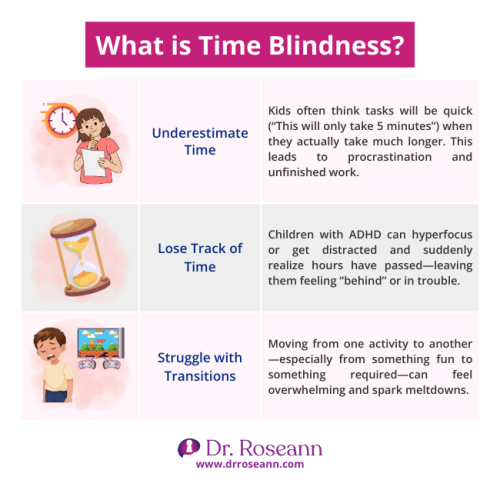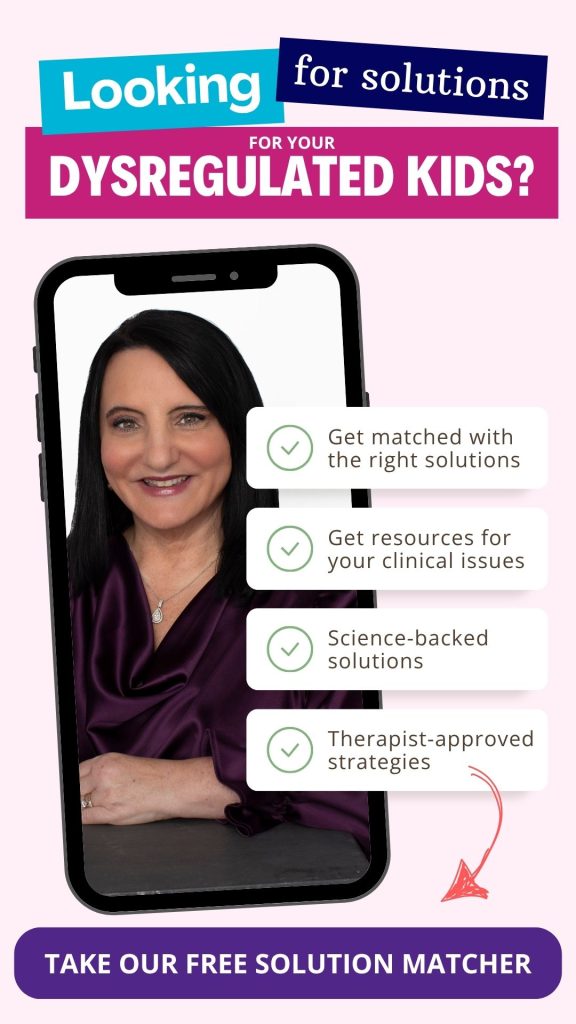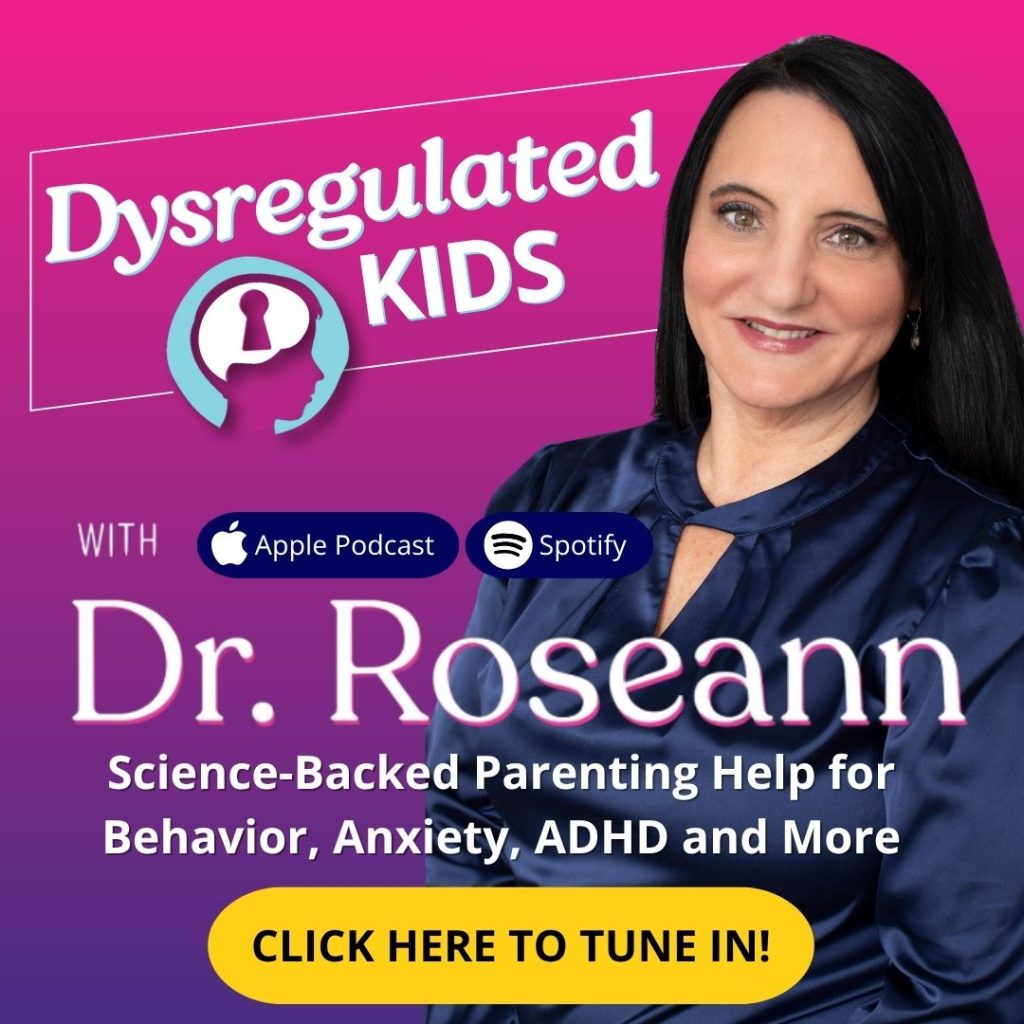Estimated reading time: 8 minutes
Does your child always seem to be running late, losing track of time, or procrastinating until the very last minute? If so, you’re not imagining it—and you’re not alone.
For many kids with ADHD, these struggles aren’t about laziness or defiance. They’re rooted in something called time blindness. This is a neurological challenge that makes sensing and managing time incredibly difficult.
Understanding time blindness matters. It’s because once parents see it for what it is—not “bad behavior,” but a brain-based struggle—they can finally start to support their child in a way that works.
We’ll explore what time blindness is. Why kids with ADHD struggle with it and what it looks like day to day. Most importantly, I’ll discuss the science-backed strategies you can use to help your child thrive.
What Is Time Blindness In ADHD Children?
Time blindness is the difficulty—or sometimes inability—to sense, estimate, and manage the passage of time.
Children with ADHD often live in what researchers call “chronic presentism.” They’re anchored in the now. It makes anticipating the future or reflecting on the past feel almost impossible.
- They underestimate how long tasks take (thinking homework is “just 10 minutes” when it’s really an hour).
- They lose track of time and are stunned when hours slip away.
- They struggle with transitions, which leads to lateness and meltdowns.

How Does the Brain Affect Time Perception?
At the core of time perception lies the prefrontal cortex (PFC). It’s the brain’s “control center” for executive functions like planning, organizing, and managing time.
In ADHD, this brain region doesn’t operate the same way as in neurotypical peers:
- Executive functions like planning and prioritizing are weaker (Barkley, 2012).
- Working memory struggles make it harder to create and hold “time maps.”
- Temporal processing (judging how much time has passed) is impaired.
As ADHD expert Russell Barkley (2012) explains: “ADHD is fundamentally a disorder of time management.”
Why Do Kids With ADHD Struggle With Time?
Multiple studies show kids with ADHD experience both structural and functional differences in their brains. It impacts time perception.
- Structural: Slight differences in the size and connectivity of the PFC (Frodl & Skokauskas, 2011).
- Functional: Brain scans reveal less efficient activation in executive tasks (Fassbender et al., 2004).
- Neurochemical: Imbalances in dopamine and norepinephrine disrupt attention and temporal processing (Mehta et al., 2019).
Psychiatrist Thomas E. Brown describes it well: “ADHD is not a disorder of knowing what to do; it’s a disorder of doing what you know—especially when time is involved.”
When you add hallmark ADHD traits like impulsivity, distractibility, and procrastination, time blindness becomes an everyday challenge.
Signs of Time Blindness in Children and Teens
Parents often describe their child as “living in their own world.” Common signs include:
- Chronic lateness
- Difficulty estimating task length
- Forgetting deadlines or appointments
- Procrastination and last-minute rushing
- Trouble transitioning from fun activities to responsibilities
Parent Story:
Riza, mom of a 12-year-old, shared: “Mornings were chaos. My son would start playing with Legos and lose all sense of time. By the time I noticed, we were already late for school.”
Takeaway: These struggles aren’t defiance—they’re neurological.
How Time Blindness Affects School, Home, and Relationships
The impact is real and far-reaching:
- At school: Kids mismanage test time, forget assignments, or can’t pace themselves.
- At home: Families experience constant stress from rushing and transitions.
- In relationships: Chronic lateness strains friendships and trust.
- Emotionally: Kids often feel anxious, ashamed, or “behind.”
Strategies That Help Kids Manage Time Blindness
While we can’t change how your child’s brain is wired, we can support their nervous system. We can give them tools to compensate.
Practical strategies include:
- Timers & alarms for transitions
- Visual aids (planners, digital calendars)
- Time-blocking tasks into manageable segments
- Transitional rituals (stretching, deep breaths between tasks)
- Daily routines to reduce unpredictability
- Sleep hygiene to reset the internal clock
Parent Story: Mark, dad of a 15-year-old, said, “We started setting a 15-minute warning alarm before transitions. It changed everything—no more surprise meltdowns.”

How to Support Your Child With Time Blindness
Parents are essential co-regulators. When you model calm and create structure, you help your child’s nervous system settle.
You can:
- Stay patient—don’t label them as “lazy.”
- Provide scaffolds like alarms and reminders.
- Teach them to estimate time and compare to reality.
- Advocate for accommodations at school.
Can Kids Overcome Time Blindness With the Right Support?
Yes—with consistency and tools, kids can thrive.
Emma’s story: Once chronically late, Emma learned to use alarms and calendars through the BrainBehaviorReset® program. With practice, she became more punctual and confident.
Hopeful Note: Time blindness doesn’t mean your child can’t succeed. Regulate. Connect. Correct.™, and you give them the calm foundation they need to build executive functioning skills.
Read more about: Children’s Executive Functioning: Hidden Keys to Calm and Success
Hope for Parents: Helping Your Child Move Beyond Time Blindness
Time blindness is a brain-based challenge, not a character flaw. You can understand the science, recognize the signs, and put the right tools in place. Then, your child can feel calmer, more confident, and better equipped to succeed.
Remember: Calm the brain first, and everything else follows.
Next Step: Take our ADHD Quiz or try the Solutions Matcher to discover personalized strategies for your child.
FAQs About Time Blindness
Is time blindness only an ADHD issue?
It’s most common in ADHD but can also appear in autism, anxiety, or mood disorders.
Can therapy or medication fix time blindness?
Medication may help focus. But actual progress occurs when you regulate the nervous system and utilize practical supports.
How can teachers help students with time blindness?
By giving time cues, using visual schedules, and breaking assignments into smaller steps.
Terminology
- Prefrontal cortex (PFC): The brain’s control center for planning and time.
- Executive functioning: Mental skills for planning, prioritizing, and regulating behavior.
- Temporal processing: The ability to sense and measure the passage of time.
Citations
Fassbender, C., Murphy, K., Foxe, J. J., Wylie, G. R., Javitt, D. C., Robertson, I. H., & Garavan, H. (2004). A topography of executive functions and their interactions revealed by functional magnetic resonance imaging. Cognitive Brain Research, 20(2), 132–143. https://doi.org/10.1016/j.cogbrainres.2004.02.007
Frodl, T., & Skokauskas, N. (2011). Meta-analysis of structural MRI studies in children and adults with attention deficit hyperactivity disorder indicates treatment effects. Acta Psychiatrica Scandinavica, 125(2), 114–126. https://doi.org/10.1111/j.1600-0447.2011.01786.x
Mehta, T. R., Monegro, A., Nene, Y., Fayyaz, M., & Bollu, P. C. (2019). Neurobiology of ADHD: A Review. Current Developmental Disorders Reports, 6(4), 235–240. https://doi.org/10.1007/s40474-019-00182-w
Always remember… “Calm Brain, Happy Family™”
Disclaimer: This article is not intended to give health advice, and it is recommended to consult with a physician before beginning any new wellness regimen. The effectiveness of diagnosis and treatment varies by patient and condition. Dr. Roseann Capanna-Hodge, LLC, does not guarantee specific results.
Are you looking for SOLUTIONS for your struggling child or teen?
Dr. Roseann and her team are all about science-backed solutions, so you are in the right place!
©Roseann Capanna-Hodge










